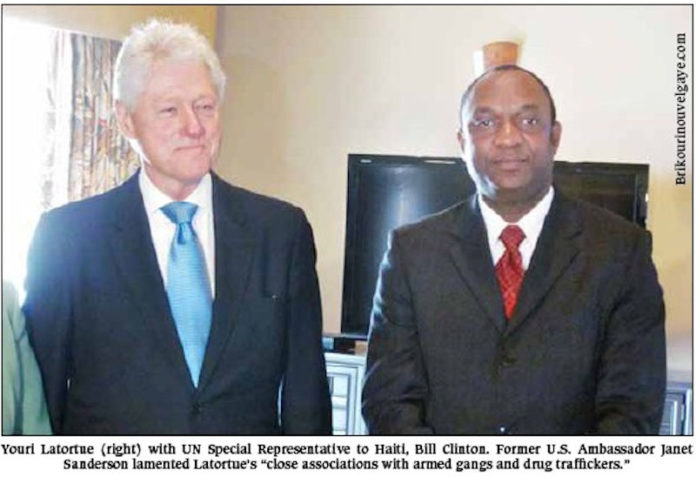Youri Latortue is one of Haiti’s most powerful politicians.
As an outspoken Senator, he is an ally of Haitian President Michel Martelly. Both are leading advocates for reestablishing the demobilized Haitian Army. He supported Martelly’s nominee for Prime Minister, neoliberal businessman Daniel-Gérard Rouzier, who was rejected by the Parliament in a Jun. 21 vote.
But Youri Latortue is also a drug-trafficker, gang godfather, and death-squad leader, according to the testimony and reports of many colleagues, crime witnesses and government officials, both Haitian and international.
In fact, “Senator Youri Latortue may well be the most brazenly corrupt of leading Haitian politicians,” according to the U.S. Embassy. Secret U.S. State Department cables obtained by the media organization WikiLeaks and reviewed by Haïti Liberté paint a portrait of a relentlessly unscrupulous, ambitious strongman, who has helped bring down Haitian governments and holds Gonaïves, Haiti’s fourth largest city, as his personal fiefdom.
His Rise to Power
Born in Gonaïves, Youri Latortue went to law school in Port-au-Prince and then graduated from Haiti’s military academy in 1990. He became a lieutenant in the Haitian Armed Forces (FAdH), teaching briefly at the Military Academy. But after the Sep. 30, 1991 coup d’état against President Jean-Bertrand Aristide, Latortue joined the Army’s notorious Anti-Gang Unit (previously called Criminal Research) headed by Col. Michel François, one of the coup’s principal leaders.
“It was widely known that he was involved in many of the political killings carried out during the 1991-94 coup, in particular the shooting of Father Jean-Marie Vincent in August 2004,” explained a once highly-placed government security source who wishes to remain anonymous. “He was one of Michel François’ death-squad leaders.”
In 2004, a delegation of the Center for the Study of Human Rights wrote that “a former high-ranking police official from the USGPN (palace security), Edouard Guerrière… claims that Youri Latortue participated in the 1994 murder of Catholic priest Jean-Marie Vincent (as did eyewitnesses in 1995), and that he assisted in the 1993 murder of democracy activist Antoine Izméry.”
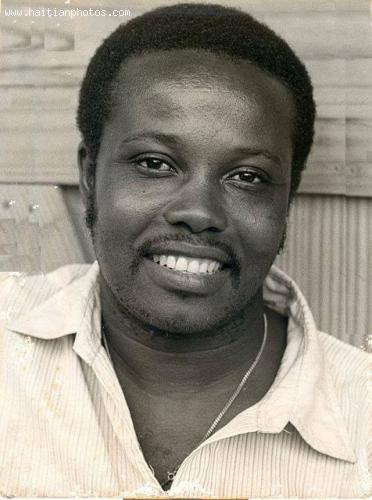
In 2005, a U.S. policeman with the United Nations Police (UNPOL) videotaped an interview that he made with a young woman who feared for her life “because the 28th of August 1994, I witnessed Youri Latortue murder the priest by the name of Jean-Marie Vincent,” she said. The video, released in October 2010 by the Haiti Information Project (HIP), is now available on YouTube.
She describes how the priest drove up to his gate that night. “That’s when I saw… a double white pickup with a bunch of men in black,” she continued. “I saw Youri… I [didn’t recognize] the other ones. But the reason why I remember Youri [was] because he used to come to [name removed] house. And I saw him getting out of the [pick-up] and shooting at the car. But at that time, I didn’t know [the victim] was a priest… I didn’t know the person who was in that car.” It was only later that she learned who it was (see Haïti Liberté, Vol.4, No.14, 10/20/2010).
The video-taped interview was sent to HIP with the following note: “The UN has no interest in pursuing this case or revealing this evidence despite the statements of this eyewitness that Youri Latortue was the triggerman that shot and killed Father Jean-Marie Vincent on August 28, 1994…. It is a travesty of justice that the UN has been withholding this testimony from the public. They are supposed to be impartial but Latortue has powerful friends in the US Embassy who view him as an asset since his role following the ouster of Aristide in 2004.”
After Aristide returned to Haiti from exile on Oct. 15, 1994, he dissolved the FAdH in early 1995, and Latortue was transferred to the Interim Police force, made up of former FAdH soldiers. Dr. Fourel Célestin, a former FAdH colonel, was appointed as President Aristide’s security advisor, and he proposed bringing Youri Latortue into the Palace security under his aegis.
“Aristide was dead set against it, having heard the persistent rumors of Latortue’s murderous role during the coup,” the former government source said. “But Célestin convinced him, arguing that the Palace needed to have some of the Army bad guys if it was going to dismantle and neutralize the force.” Aristide relented.
In March 1995, unknown assassins shot to death well-known pro-coup spokeswoman Mireille Durocher-Bertin and another passenger in her car on the eve of President Bill Clinton’s visit to Haiti. The shooting was a tremendous embarrassment to the Aristide government and to Clinton. A team of FBI agents spent time in Haiti investigating the murder, and Youri Latortue was one of their suspects. Washington yanked Latortue’s U.S. travel visa.
Latortue worked out of Célestin’s Palace office until 1996 when President René Préval took power. Washington insisted that certain former FAdH officers deemed too close to Aristide – Célestin, Major Dany Toussaint, Major Joseph Médard – be removed from leadership of the new police and two new Palace Security details: the USP (Presidential Security Unit), similar to the U.S. Secret Service, and the USGPN (Security Unit to Guard the National Palace). When they were removed, that left a void in the Palace security’s command, a void that was filled by Latortue. He became the USGPN’s deputy chief under Frantz Jean-François. Two better trusted pro-Lavalas security agents – Nesly Lucien and Oriel Jean – were named to head the USP. That arrangement lasted throughout Préval’s term (despite his grave misgivings about Latortue, as we shall see) until he handed the Presidency back to Aristide in 2001.
Aristide Returns, Youri Takes Leave
“After Aristide’s accession, other USGPN policemen found [Latortue] ‘hostile’ to his new President, who worried about his involvement in a ‘plot,’ according to Haiti’s elite-owned radio station Signal FM on February 21, 2001,” Canadian investigative journalist Anthony Fenton wrote in a June 2005 Znet article entitled “Have the Latortues Kidnapped Democracy in Haiti?”.
At that point, Latortue was transferred out of the Palace to work under Nesly Lucien, who had been named Police Chief. But in late 2001, Latortue took a paid leave of absence from the police to pursue a master’s degree in law in Canada. He “had lived in Miami, [and] studied in Montreal for two years” he told Fenton in a June 2005 phone interview.
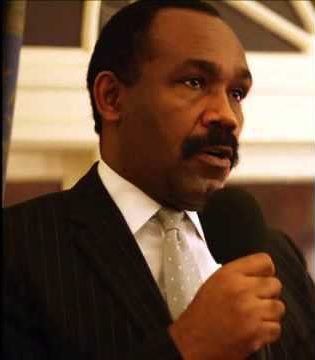
It was during that time that Latortue was paid a visit by Stanley Lucas, an operative for the International Republican Institute (IRI), a tentacle of the U.S. government’s National Endowment for Democracy (NED), according to our security source. IRI was playing a central role in organizing the “civilian opposition” to Aristide, principally the so-called “Group of 184,” headed by sweatshop magnate Andy Apaid. But Lucas was also keeping touch with the “armed opposition” of former Haitian soldier and police chief Guy Philippe in the Dominican Republic. This is where Youri came in.
During 2002 and 2003, Latortue shuttled back and forth between the U.S., Canada, and the Dominican Republic, meeting with Guy Philippe, former FRAPH death-squad leader Jodel Chamblain, and others in the “rebel” force forming, training, and launching raids into Haiti. Interestingly, Youri’s U.S. travel visa, which had been suspended in 1995, was reinstated in 2002 when he started to play this role of anti-Aristide intermediary.
“We know that Youri was one of the intellectual authors, one of the key planners, behind the Dec. 17, 2001 attack on the National Palace,” when a band of Philippe’s “rebels” briefly took over the National Palace during a failed coup attempt, our well-placed source explained. “In the investigation after the attack, we learned that it was Youri’s people – his proteges – in the USGPN who, working inside the Palace, let the attackers into the Palace grounds.”
Finally Latortue, Philippe, Lucas, IRI, and the 184 were successful in their destabilization campaign after a U.S. SEAL team kidnapped Aristide from his home on Feb. 29, 2004, completing the second coup against him.
After the 2004 Coup
Youri Latortue then flew back to Haiti with his first cousin once-removed, Gérard Latortue in tow. A few weeks later, Gérard Latortue was installed as de facto Prime Minister. Youri Latortue, often called Gérard’s “nephew,” was appointed as his security and spy chief, with the title “Responsible for National Intelligence to the Primature.”
“The thing was that Gérard had been working for international organizations overseas most of his life and didn’t really know the lay of the land in Haiti,” our security source explained. “He had to rely largely on Youri for guidance. In that sense, Youri was practically the shadow Prime Minister. And during that coup, he was the main one responsible for the massacre of many militants in Belair, Cité Soleil and other pockets of resistance.”
In his post, Latortue was “nicknamed ‘Mister 30 Per Cent’ because of the percentage he demands in return for favors,” wrote Thierry Oberlin in the December 21, 2004 Le Figaro. “Worried, not without reason, about his own security, the prime minister pays 20,000 euros a month to this former police officer implicated in various scandals for ‘organizing an intelligence service’.”
Then something interesting happened. In late 2004, Gérard Latortue left Haiti to travel to a conference in Canada, passing through Miami. Youri was part of his delegation. But in Florida, U.S. agents detained Youri for his suspected involvement in drug-trafficking. (Joel Deeb, a Haitian-American arms dealer who reportedly brokered deals with Youri Latortue, “stated that Youri Latortue presently has four sealed DEA indictments pending against him, and that the DEA [has] issued an extradition letter for Youri Latortue to the interim government,” Fenton learned in several interviews with Deeb between April and June 2005. “Youri Latortue himself evaded questions about the DEA indictments, denying that he and Deeb, as Deeb claims, were in regular contact.”)
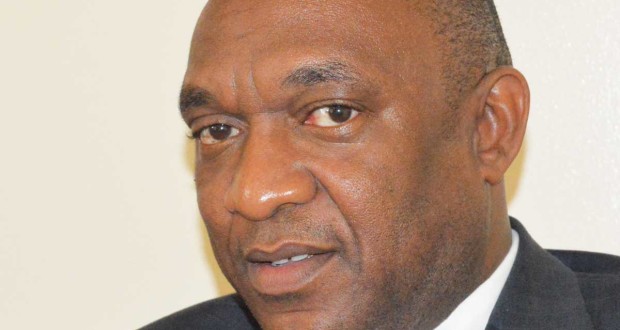
Gérard Latortue got on the phone to officials in Washington and demanded that Youri be released. Eventually, U.S. officials said they would not hold Youri, but on the condition that he take the next flight back to Haiti, which he did.
“When Gérard returned to Haiti after the Canada visit, he met with Youri about the incident and about his vulnerability to prosecution,” our source explains. “They determined that the best course of action was for Youri to become an elected official, which would confer upon him immunity from prosecution. That is why and how Youri’s political career began, assured by Gérard, under whom his election was assured.”
Thus, under his “uncle’s” government, Youri was elected to a six-year term as the first senator of the Artibonite Department in the Feb. 7, 2006 elections that also brought Préval to the Presidency for the second time.
This is where the U.S. Embassy cables pick up the thread.
A Drug Dealer and Kidnapper in the Palace?
When Youri Latortue worked in the Palace under Aristide and Préval, neither president was comfortable with his presence there and knew he was involved in illegal activities. But they were afraid to act against him. “Among political observers, it is an article of faith that Latortue was involved in drug trafficking under Aristide and during the first Préval administrations,” reported U.S. Ambassador Janet Sanderson in a June 27, 2007 cable to Washington. “Préval himself reports that Latortue ‘ran drugs’ out of his office in the Presidency during Aristide’s mandate.”
Préval said the same thing to Sanderson’s successor, current Ambassador Kenneth Merten, who reported in an Oct. 6, 2009 secret cable that the Haitian president “also expressed concern over the lack of integrity of the president of the Senate Commission on Justice and Security, Senator Youri Latortue, implying ties to the drug trade. He supported his viewpoint by recalling the USG’s [U.S. government’s] alleged refusal to allow Latortue to travel to the United States” in 1995 and 2004.
The U.S. Embassy treated Latortue warily when he returned to Haiti in 2004. The first conflict they had with him was when he took it upon himself to tell “some of the ex-soldiers in Cap-Haïtien” who had taken part in Guy Philippe’s “rebel” force “that they would be admitted into the HNP,” or Haitian National Police. “This raised a red-flag for us and the rest of the international community and was a subject of the Core Group meeting March 12,” reported Sanderson’s predecessor, Ambassador James Foley in a Mar. 15, 2005 cable. The U.S. and its allies went to Prime Minister Gérard Latortue who “made clear this was not the case,” pleasing them with “his public acknowledgment that the HNP was not an automatic option for the ex-FADH.”
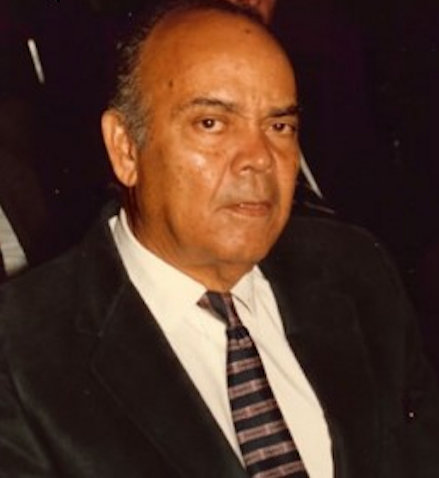
Two months later, a prominent member of Haiti’s bourgeoisie, businessman Fritz Mevs, told the U.S. Embassy that “Colombian drug-traffickers” were working “with a small cabal of powerful and connected individuals, including Youri Latortue… to create a criminal enterprise that thrives on – and generates – instability,” Foley wrote in a May 27, 2005 cable. This cabal which included Youri was a “small nexus of drug-dealers and political insiders that control a network of dirty cops and gangs that […] were responsible for committing the kidnappings and murders.”
The Embassy also worried that Youri was beginning to alienate some in the anti-Lavalas coalition that had driven Aristide from power, particularly students. They were starting to distrust the Interim Government of Haiti (IGOH), as the Latortues’ de facto regime was called, because “rumors are rife that the IGOH (and specifically Youri Latortue) is building an ‘intelligence cell’ within the student movement for political ends,” wrote interim Chargé d’Affaires Douglas M. Griffiths in a July 6, 2005 cable.
Washington was also closely watching the emergence of the Artibonite in Action (LAAA), the party Youri Latortue formed in 2005 to run for Senate. “This party may have nefarious sources of income and has already been implicated in gang-related violence in the poorer neighborhoods of Raboteau and Jubilee in Gonaïves,” wrote another interim Chargé d’Affaires Erna Kerst in a Nov. 30, 2005 cable.
As Sanderson took over the Embassy in early 2006, she also echoed that Youri Latortue is “widely believed to be involved in illegal activities,” in a Jun. 16, 2006 cable.
Less than two months later, on Aug. 2, she sent another cable that reported that Edmond Mulet, the chief of the U.N. Mission to Stabilize Haiti (MINUSTAH), was concerned that “drug trafficking has become an increasingly alarming problem, which is difficult to combat, in part because of the drug ties within the Haitian Government,” Sanderson wrote. “In this connection, he mentioned Senate leader Joseph Lambert and Security Commission Chair Youri Latortue — describing the latter as a ‘drug dealer’.”
Arms dealer Joel Deeb also called Latortue “a drug smuggling ‘Kingpin,’ with ‘close ties’ to paramilitary leader Guy Philippe,” Anthony Fenton reported in his ZNet article. “Deeb also said that ‘everybody knows’ about Youri Latortue’s involvement in kidnappings,” which were plaguing Haiti at the time.
The Artibonite in Action (LAAA), the party Youri Latortue formed in 2005 to run for Senate, “may have nefarious sources of income,” wrote the U.S. Embassy.
“It is also widely known that Youri Latortue and his deputy, Jean-Wener Jacquitte,… are, at the least, funneling money associated with kidnappings,” Fenton continued. “This has been confirmed by sources both in diplomatic circles, as well as sources inside and outside the de facto Haitian government.”
In a September 2006 cable, Sanderson reported that Youri was able “to hire his ‘cronies’ to run customs’ operations in Gonaïves” and, in a November 2006 cable, that Gonaïves Judge Napela Saintil, who had presided over the landmark 2000 Raboteau Massacre trial (at which Youri Latortue “refused to testify”), considered Latortue “his ‘arch enemy’” and “accused a security agent of Latortue’s, Leon Leblanc, of attempting to assassinate him in March, 2004.”
One of Sanderson’s most enlightening cables is that of Nov. 20, 2006. It is based on a Nov. 9 meeting that one of Youri’s close associates (whose name has been removed from this report and the cable posted on WikiLeaks’ site to protect him) had with Embassy political officers or “poloffs.” The colleague “shared with poloffs his concerns regarding Latortue’s illegal or otherwise unsavory activities in the port city of Gonaïves and other areas of the Artibonite,” Sanderson wrote. “Latortue’s family connections play a part in his ability to manipulate the region, as do his close associations with armed gangs and drug traffickers.”
An Ambitious Politician
“The Latortue family is crawling all over Haitian politics,” the man told the Embassy. “Youri’s sister is the former mayor of Gonaïves, and the former delegate to the region was a cousin of his as well. The administration filled Haiti‘s local and municipal offices by presidential appointment during the IGoH. Senator Latortue had influence over these appointments through his relation with IGoH Prime Minister Gerard Latortue, and managed to place members of his party in most positions around the Artibonite. The senator used these people to consolidate his power and influence in the region until the new delegate to the Artibonite appointed new local and regional officials who were not in the back pocket of Senator Latortue.”
The colleague “likened Senator Latortue’s authority in the port city of Gonaïves to that of a mafia boss,” the cable continued. “He claimed that the somewhat lethargic port and the drug and other contraband trafficking taking place there are completely under the Senator’s command. The port in Gonaïves is largely controlled by the Cannibal Army gang, which faces persistent competition from two other gangs, Des Cahos and Jubile Blan. Senator Latortue exerts influence over all three groups and is thus able to maintain sway over dealings in the port. Senator Latortue’s other businesses in Gonaïves include a nightclub and movie theater, both of questionable legitimacy.”
Sanderson also noted that “an oft-disruptive popular organization in St. Marc named ‘Bale Wouze’ recently accused the senator of distributing weapons in an effort to destabilize the government.” Latortue’s colleague “phoned the Embassy on November 16 to reinforce the Bale Wouze accusations, and also to report another incident in which Senator Latortue and friends were stealing telephone poles and utility boxes from Port-au-Prince for use in Gonaïves.”
The colleague described how Youri was a savvy politician. “After the large-scale flooding in the Artibonite in September, the central government allocated emergency food supplies to be distributed to the flood victims,” Sanderson wrote, but “Senator Latortue intercepted the supplies and stashed them temporarily somewhere in Gonaïves, and then took the supplies to the victims and acted as if he was personally responsible for the handouts.”

